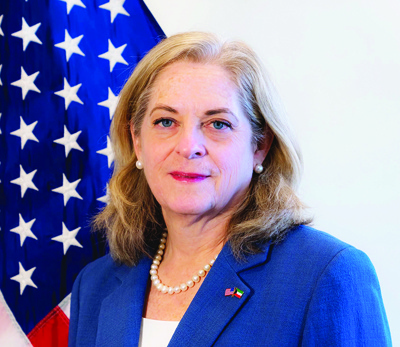By US Ambassador to Kuwait Alina L Romanowski
Today is International Anticorruption Day, a day to recognize that everyone has a role in tackling corruption. Together we can promote resiliency and integrity at all levels of society. Corruption affects us all. The magnitude of money movement related to corruption cannot be overstated: A 2018 United Nations study revealed that an estimated $2.6 trillion is stolen annually through corruption, which is equivalent to more than 5 percent of the global gross domestic product.
Illicit actors exploit global markets to hide ill-gotten gains through mechanisms such as shell companies or fraudulent real-estate transactions. Without strong institutions in place, countries can fall victim to embezzlement of public resources and public health systems may unravel, which can further complicate efforts for economic rehabilitation.
The international community has taken numerous measures to fight corruption over the past year. The United Nations General Assembly held its first-ever special session on corruption last June. During the session, it welcomed the Riyadh Initiative, creating an international consortium of law-enforcement authorities to facilitate information sharing and cooperation across borders.
The United States has taken action as well. On June 3, President Biden released the National Security Memorandum on the Fight Against Corruption - a call to action for the US government and its partners to design and implement a plan to modernize and coordinate efforts to better fight corruption, tackle illicit finance, and hold corrupt actors accountable. Kuwait, a signatory to the United Nations Convention against Corruption (UNCAC), has joined the United States in these efforts by strengthening technical capacities to counter illicit finance.
This past June, the US Embassy, through the US Department of Justice, engaged in multiple workshops with over 100 Kuwaiti investigators and prosecutors on combatting illicit finance. Participants exchanged ideas about the latest methods of money laundering, such as using cryptocurrency, forensic accounting, freezing and seizing assets overseas, and using international networks to obtain evidence and hold corrupt actors accountable. Participation in these workshops demonstrates a commitment to ensuring that Kuwait's legal regime can combat corruption. Kuwait's Public Prosecution has pursued impactful cases, and I have no doubt that they will be able to face future challenges.
The United States and Kuwait also work through the Financial Action Task Force (FATF) to ensure that countries adhere to beneficial ownership transparency standards and other mechanisms to ensure that ill-gotten gains do not pass through the country. The United States stands ready and committed to work with Kuwait in this regard, from working with law enforcement to assisting Kuwait with its FATF evaluation scheduled for 2022.
Today marks the beginning of a momentous month. Earlier this week, the Biden-Harris Administration released the first-ever Strategy on Countering Corruption, outlining the United States' comprehensive approach to tackling corruption. From December 13 to 17, the international community will convene the ninth session of the Conference of the States Parties to the UNCAC to focus on issues such as asset recovery and international cooperation. Kuwait has been a key ally and great friend to the United States over the past 60 years. Together, let's internalize the International Anti-Corruption Day theme of "Your right, your role: Say no to Corruption."





